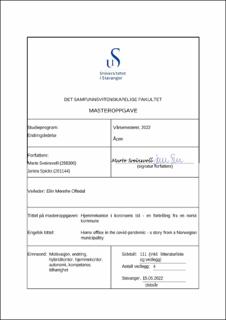Hjemmekontor i koronaens tid - en fortelling fra en norsk kommune
Master thesis
Permanent lenke
https://hdl.handle.net/11250/3022614Utgivelsesdato
2022Metadata
Vis full innførselSamlinger
- Studentoppgaver (SV-IMS) [1384]
Sammendrag
I denne oppgaven undersøker vi hvordan den indre motivasjonen oppleves på hjemmekontor.Bakgrunnen for oppgaven er den kraftige økningen i bruk av hjemmekontor som følge avkoronapandemien, og viktigheten av å bidra til ytterligere forskning på fremtidens arbeidsmåteri en hybrid hverdag. Dermed utledet vi følgende forskningsspørsmål: Hvordan dannesmotivasjon i perioder med hjemmekontor?
For å besvare forskningsspørsmålet har vi utarbeidet en kvalitativ studie med fenomenologisktilnærming. Vi samlet inn empiriske data ved å gjennomføre dybdeintervjuer med tolv ansattei en kommune, med erfaring fra hjemmekontor. Med utgangspunkt i Ryan og Deci sinselvbestemmelsesteori har vi forsket på hvilken betydning de tre grunnleggende psykologiskebehovene autonomi, kompetanse og tilhørighet har hatt på den indre motivasjonen. Funnene fraintervjuene viste at autonomi og tilhørighet har større betydning for motivasjonen ennkompetanse. I tillegg ble det avdekket at muligheten for hybridkontor har en positiv betydningfor den indre motivasjonen. Vi kan dermed se på opplevelsene av motivasjon på hjemmekontorog tilrettelegging av hybridkontor som et svar på arbeidstakers ønsker for det fremtidigearbeidslivet. This master's thesis explores how the intrinsic motivation is experienced when working from home. The background for the thesis is the Covid-19-related increase in home office, and the importance of contributing to further research on organizing the post-pandemic workplace. Thus, the following research question was developed: How is motivation formed during periods of home office?
To answer this research question, we prepared a qualitative study with a phenomenological approach. The empirical data was collected by conducting in-depth interviews with twelve experienced home office workers in a Norwegian municipality. Based on Ryan and Deci's Self-Determination theory, we have researched the significance of the three basic psychological needs: autonomy, competence and relatedness on intrinsic motivation. The results from the interviews show that autonomy and relatedness have a greater significance on motivation than competence. In addition, having the possibility to employ a hybrid workplace was found to have an impact on the intrinsic motivation. The needs of the future working life can therefore be assessed through the employees motivation during home office.
